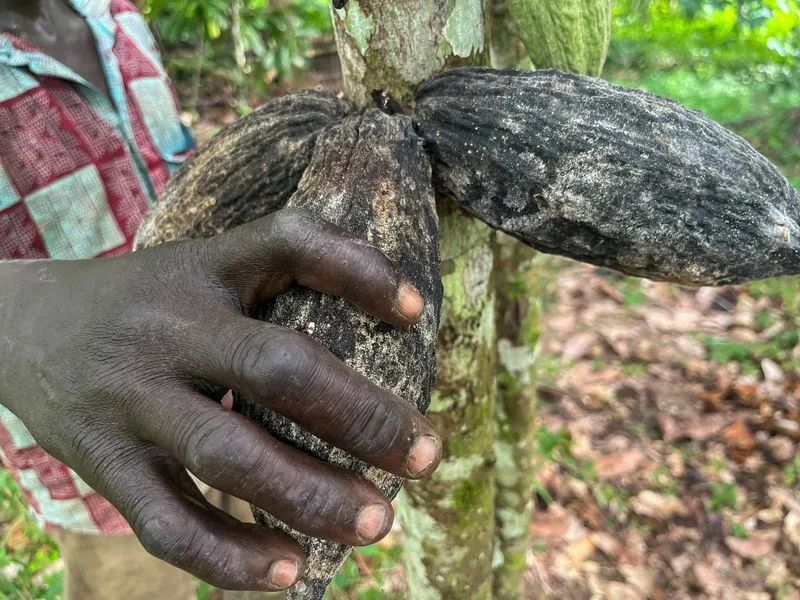Ivory Coast’s Cocoa Futures Sales Suspended Amid Supply Chain Uncertainties and Brown Rot Outbreak

Rotten cocoa pods after torrential rains experienced from mid-May, affecting cocoa production in all regions, at Akressi village in the Aboisso region, Ivory Coast. Image source: REUTERS
In a significant development impacting the global cocoa market, the Ivorian Cocoa Coffee Council (CCC) has announced the suspension of cocoa futures sales for the 2023/2024 campaign until further notice. The decision comes in light of ongoing uncertainties surrounding the cocoa supply chain, exacerbated by adverse weather conditions and the outbreak of brown rot disease.
Yves Brahima Kone, the director general of CCC, revealed that concerns over the availability of an adequate quantity of raw materials from production areas to cover sales, combined with heavy rains between May 15 and July 10, have severely affected cocoa production. The persistent humidity has also provided ideal conditions for the proliferation of brown rot, a fungal disease that poses a threat to cocoa trees. CCC acknowledged the disease’s rapid spread across many plantations and is promptly assessing the situation to gain a comprehensive understanding.
Mr. Kone expressed apprehension about the cocoa harvest in the initial stages of the main season, expecting a considerable decline compared to the current year. He emphasized the importance of the production from January to March in offsetting potential volume imbalances. Currently, the cocoa sales have already exceeded one million tonnes, accounting for approximately 50% of the projected harvest of 2.2 million tonnes.
The impact of the brown rot outbreak and the suspension of cocoa sales will be felt by various stakeholders, including major commodities trading houses such as Cargill, Olam, and prominent chocolate manufacturers like Barry Callebaut, Hershey, and Nestle. Furthermore, this development represents a significant blow to Ivory Coast, a nation heavily reliant on cocoa, with the United Nations estimating that it contributes 40% of the country’s export earnings. Ivory Coast and other major cocoa producers including Ghana, Nigeria and Cameroon that account for around 70% of global production, have witnessed heavy tropical downpours in recent weeks.
Farmers, cocoa pod counters, and exporters based in Ivory Coast are bracing for a notable decline in cocoa output during the initial phase of the main harvest. The CCC’s initial projection for the current season was a total cocoa output of 2.2 million tonnes.
Ivory Coast, recognized as the world’s leading cocoa-producing country, supplying 45% of global cocoa, is aiming to increase domestic cocoa processing. The country plans to process 49% of its production starting from October by adding several new processing plants. Currently, approximately 35-40% of cocoa is processed within the country, with the remainder exported. However, the government intends to raise the domestic processing share to at least 50%.
To support this goal, Ivory Coast has entered into contracts with the United Arab Emirates for the construction of a new plant in San Pedro, with a grinding capacity of 120,000 tonnes, and China for the construction of two factories, each with a production capacity of 50,000 tonnes. Upon completion, these new facilities will enable the country to process over 1 million tonnes of cocoa annually, solidifying its position as the world’s leading cocoa grinder.
The global cocoa market will closely monitor the situation in Ivory Coast as stakeholders navigate the challenges posed by the supply chain uncertainties and the brown rot outbreak. Eagmark will continue to report on the developments and their potential ramifications for the international cocoa industry.



